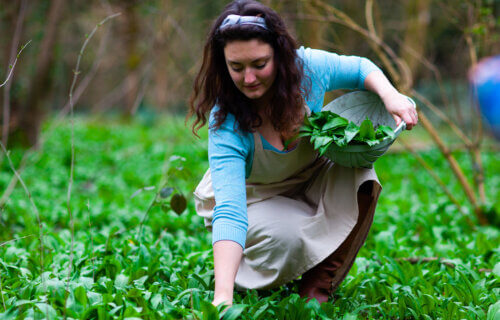Many of us want to live long, happy and healthy lives. Yet it’s often confusing to know the best way to achieve this, and many aspects of modern, westernized living conspire to keep us from achieving this goal. The solution may be to step back in time. For the bulk of our existence, we evolved following a hunter-gatherer lifestyle of foraging for food and hunting animals. Today, only a few hunter-gatherer communities still exist, such as the Hadza of Tanzania.
Research shows that many of the health problems that plague modern society, such as cardiovascular disease and poor mental health, have very low prevalence among hunter-gatherer societies of both past and present day. This suggests there’s much we can learn from hunter-gatherers to improve our lives.
Building connections
Hunter-gatherers knew the best strategy for survival was connecting and staying together. With finite resources, they are egalitarian by nature. Each member contributes, shares equally and belongs to a collective greater than themselves. Life has meaning and purpose.
According to James Woodburn, an anthropologist who studied the Hadza, tribe members “value their life as hunter-gatherers, they regard it as a wonderful life. They have a living which makes sense.” The Japanese call this fundamental reason for being “ikigai”, which can add quality years to your life. Living in small communities of around 20-30 people creates close relationships and a strong social support network.
Close meaningful relationships are key drivers of health and happiness across our lifespan. In fact, our brains are so wired to connect that our well-being depends on it. Many aspects of modern society, such as urbanization, the nuclear family and consumerism, mean many of the connections inherent to hunter-gatherer society have been eroded.
But there are many evidence-based ways to reconnect with hunter-gatherer ethos and improve mental wellbeing.
Examples include reconnecting with people and your community (such as through volunteering) or getting involved in a cooperative. The United Kingdom’s National Health Service has even introduced a long-term social prescribing strategy, which helps people get involved with these kinds of initiatives and connect with those in their community.
Exercising in green spaces and practicing mindfulness are also great ways of connecting with the present and boosting mental health.

Eating well
Hunter-gatherers eat what nature and the land offer. This at times can be scarce, requiring periods of fasting. Diets primarily consist of plant-based foods, such as tubers, berries and fruit that are readily available. Many studies have shown that plant-based diets and fasting can have many benefits for health. For example, research on people living in so-called “blue zones” – geographic areas that have unusually high life expectancies – suggests their predominantly plant-based diets may contribute to their long lifespans.
Intermittent fasting helps to reduce calorie intake and can lower the risk of cardiovascular disease and type 2 diabetes by increasing metabolic flexibility – our ability to effectively use both carbs and fat for energy.
Because hunter-gatherers eat what nature offers, this means their diets consist mainly of whole foods. Yet in the UK and US, ultra-processed foods (such as ready-made meals) now make up a large proportion of people’s daily calorie intake. These foods typically contain lots of sugar, salt, saturated fat and artificial additives. Research has linked these foods with a range of health problems, including obesity and cancer.
Limiting intake of ultra-processed foods and adopting a diet more akin to those followed by hunter-gatherers can help improve your health.

Moving more
Hunter-gatherers evolved to move. Their nomadic lifestyle of hunting and foraging meant they consistently covered distances from six to 16km daily. But modern lifestyles are far more sedentary. Combined with diets high in ultra-processed foods, this means many of us consume more calories each day than we use, leading to weight gain.
To address this imbalance, we need to move more – and move how hunter-gatherers do.
It’s recommended adults get at least 150-300 minutes of moderate-intensity activity (such as brisk walking) or at least 75-150 minutes of vigorous physical activity (such as running or dancing) per week. While this isn’t quite as much movement as hunter-gatherers would get daily, it will still improve cardiorespiratory fitness and muscle strength, which is important for better health and longer lifespan.
Being active regularly doesn’t necessarily mean you have to go to the gym. Walking to the shops, climbing stairs and cleaning can all have a positive effect on your cardiovascular health and longevity.
But if you really want to mimic hunter-gatherers’ activity more closely, you might consider trying interval training. This involves alternating periods of moderate- or high-intensity physical activity with low-intensity activity – such as sprinting for 30 seconds on the treadmill then jogging for a minute in between to catch your breath. This mimics the vigorous kind of physical activity hunter-gatherers would have done when hunting. Interval training is also beneficial for cardiovascular health.
We can also benefit from moving more like hunter-gatherers. Movements such as squatting and getting up and down from the ground, mimic how they’d move when foraging for food. These functional movements help preserve physical independence and may add years to your life.
While our modern society certainly doesn’t make it easy to live a lifestyle more aligned with how we evolved, that doesn’t mean there aren’t many small, easy changes we can make to be healthier. Making time to socialize, focusing on getting more plants in our diets and moving more often are all things we can do daily to live more like hunter-gatherers – and look after our health.![]()
Article written by Nicholas Bourne, Senior Lecturer, Applied Sport and Exercise Science, University of East London; David Clayton, Senior Lecturer in Nutrition and Exercise Physiology, Nottingham Trent University, and Marcello Bertotti, Reader in Community Health, University of East London
This article is republished from The Conversation under a Creative Commons license. Read the original article.

Maybe it’s only and all a matter of exercise that keeps them healthy both mentally and physically.